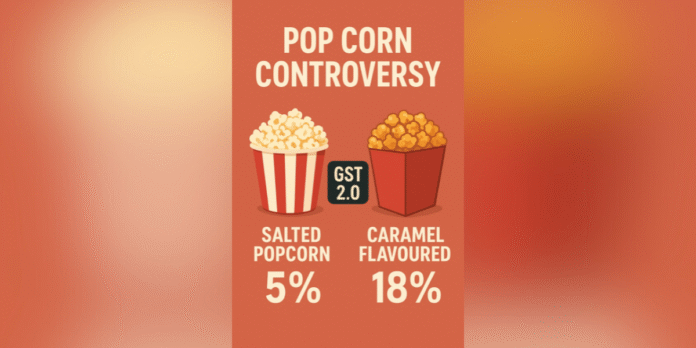The Goods and Services Tax (GST) Council has put an end to one of the most enduring debates under the regime, the taxation of popcorn. In its latest announcement, the Council clarified that salted popcorn, whether sold loose or in pre-packaged and labelled form, will now attract 5 per cent GST. Caramel-flavoured popcorn, however, has been categorised as sugar confectionery and will continue to be taxed at 18 per cent.
The clarification was issued as part of the updated GST 2.0 framework, which seeks to simplify the indirect tax system by rationalising rates and resolving anomalies that have caused disputes since the tax was first rolled out in July 2017. Officials explained that salted popcorn retains the “essential character” of a snack and therefore qualifies for the lower rate.
The taxation of popcorn has been contentious from the beginning. Initially, loose popcorn was exempt, while packaged popcorn attracted a 12 per cent GST. This led to varying rates across different points of sale, creating confusion for both small vendors and large cinema chains.
Multiplex operators had long argued that the popcorn they sold at counters should be treated like restaurant service and taxed at 5 per cent, since it was freshly prepared. However, the packaged commodity classification kept certain sales at a higher rate. By 2019, the Council clarified that popcorn sold in cinemas would be taxed at 5 per cent, while branded and packaged versions would remain at 12 per cent. The split structure, however, did little to settle the matter and even led to legal challenges.
Caramel popcorn has been consistently taxed at 18 per cent, a classification based on its sugar content and categorisation under confectionery. For sellers, the difference in rates between salted and caramel varieties meant varying pricing structures, which often added to consumer confusion.
In 2022, the Multiplex Association of India sought a uniform treatment for all types of popcorn, arguing that theatre sales involved freshly made snacks rather than fast-moving consumer goods. The association pushed for a 5 per cent rate across the board, citing fairness and clarity. The issue gained wider public attention in 2023 when the GST Council began discussing rationalisation of tax slabs. With cinema snack prices already a point of consumer debate, popcorn taxation became symbolic of the larger conversation on GST’s complexity.
The latest decision is expected to resolve much of the ambiguity. Small vendors and multiplexes alike now have clarity that salted popcorn in any form will be taxed at 5 per cent. Caramel popcorn, however, remains at the higher 18 per cent bracket, keeping it in line with other sugar confectionery products.
By clearly defining the categories and aligning them with practical sales practices, the Council has attempted to settle disputes that have persisted for years.
For consumers, the ruling could mean more predictable pricing at cinemas and retail outlets, particularly for salted popcorn. For sellers, it eliminates the uncertainty of multiple interpretations, which often led to disputes with tax authorities. While caramel popcorn will remain costlier under the higher slab, officials maintain that the classification reflects its distinct product category.
The so-called “popcorn controversy” may finally be over with this ruling. By clarifying the rates and aligning them with GST 2.0 reforms, the Council has resolved an issue that had lingered since the tax system’s inception, offering a symbolic example of the effort to simplify India’s indirect tax structure.





